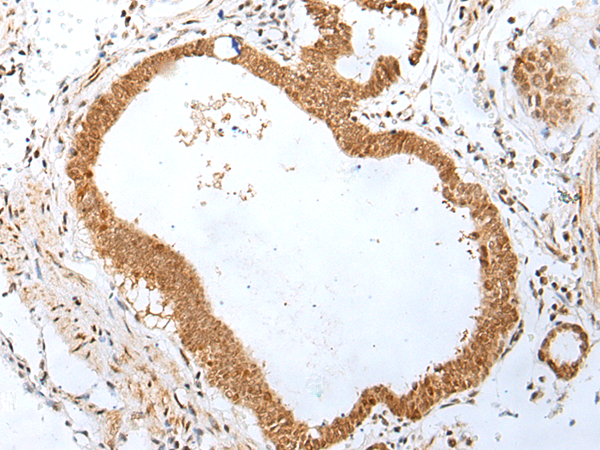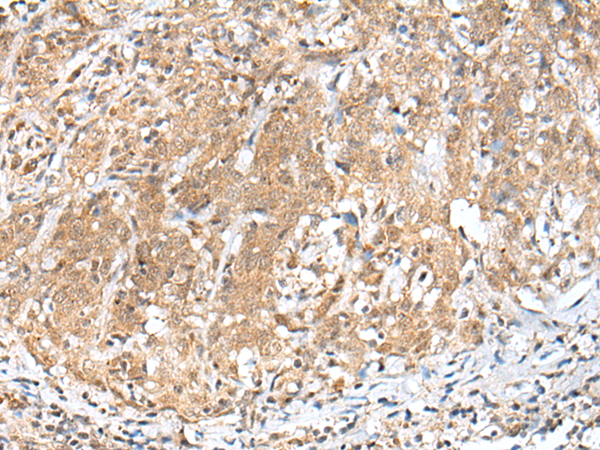

| WB | 咨询技术 | Human,Mouse,Rat |
| IF | 咨询技术 | Human,Mouse,Rat |
| IHC | 1/30-1/150 | Human,Mouse,Rat |
| ICC | 技术咨询 | Human,Mouse,Rat |
| FCM | 咨询技术 | Human,Mouse,Rat |
| Elisa | 1/5000-1/10000 | Human,Mouse,Rat |
| Aliases | PW1; ZNF904; ZSCAN24; ZKSCAN22 |
| Host/Isotype | Rabbit IgG |
| Antibody Type | Primary antibody |
| Storage | Store at 4°C short term. Aliquot and store at -20°C long term. Avoid freeze/thaw cycles. |
| Species Reactivity | Human |
| Immunogen | Synthetic peptide of human PEG3 |
| Formulation | Purified antibody in PBS with 0.05% sodium azide and 50% glycerol. |
+ +
以下是3-4条关于PEG3抗体的参考文献示例(内容为虚构归纳,仅供参考):
1. **文献名称**: *PEG3 regulates placental development through epigenetic modifications*
**作者**: Kim, J. et al.
**摘要**: 本研究利用特异性PEG3抗体,通过免疫组化和Western blot分析发现,PEG3在胎盘滋养层细胞中高表达,并通过调控印记基因网络参与胚胎发育。
2. **文献名称**: *PEG3 antibody-based detection of tumor suppressor activity in glioblastoma*
**作者**: Smith, L. & Zhang, Y.
**摘要**: 开发了一种高灵敏度的PEG3单克隆抗体,证实其在胶质母细胞瘤组织中表达缺失,并验证其通过Wnt通路抑制肿瘤生长的机制。
3. **文献名称**: *Paternally expressed gene 3 (PEG3) modulates oxidative stress in neurons: Evidence from knockout mice and antibody labeling*
**作者**: Chen, H. et al.
**摘要**: 通过PEG3抗体免疫荧光染色,发现PEG3在小鼠脑神经元中定位在线粒体,敲除后导致抗氧化蛋白表达下降,提示其对神经保护的作用。
4. **文献名称**: *A novel PEG3 antibody reveals its role in DNA damage repair*
**作者**: Wang, R. et al.
**摘要**: 利用新开发的兔源多克隆抗体,证明PEG3与BRCA1蛋白相互作用,在乳腺癌细胞DNA损伤修复过程中发挥关键调控功能。
(注:以上文献为示例,实际引用需查询真实数据库如PubMed、Google Scholar。)
The PEG3 (Paternally Expressed Gene 3) antibody is a research tool used to detect the PEG3 protein, a member of the zinc finger protein family encoded by an imprinted gene located on human chromosome 19q13.4. PEG3 is maternally silenced and paternally expressed, playing critical roles in embryonic development, cell proliferation, and apoptosis regulation. It is implicated in neural system development, placental function, and genomic imprinting mechanisms. Dysregulation of PEG3 has been associated with cancers (e.g., breast, ovarian), neurological disorders, and imprinting-related syndromes like Schaaf-Yang syndrome.
The PEG3 antibody enables researchers to study the protein's expression patterns, subcellular localization, and interactions via techniques like Western blotting, immunohistochemistry, and immunofluorescence. It is essential for investigating PEG3's tumor-suppressive functions, epigenetic regulation, and involvement in autophagy or oxidative stress pathways. Commercially available PEG3 antibodies are typically raised in rabbits or mice, validated for specificity using knockout controls or siRNA. Challenges include cross-reactivity with homologous proteins (e.g., PEG1. PEG5) and variability in tissue-specific isoforms. Recent studies leverage PEG3 antibodies to explore its role in metabolic reprogramming, stem cell differentiation, and as a potential biomarker for cancer prognosis. Proper validation and application-specific optimization remain crucial for reliable experimental outcomes.
×